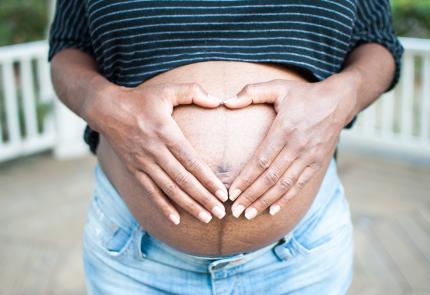The NHS Long-Term Plan (LTP) aims to reduce stillbirth, maternal mortality, neonatal mortality, and serious brain injury by 50% by 2025.[2] To achieve this there is a vital need to address these health inequities among women from vulnerable groups. [2]
To improve outcomes among women from Black, Asian and minority ethnic and disadvantaged (BAME) groups the LTP aims for 75% of women from these communities and a similar percentage of women from the most deprived groups to receive continuity of care from their midwife throughout pregnancy, labour and the postnatal period by 2024.
Perinatal mental health care in the Long Term Plan
The Long Term Plan also makes key recommendations for perinatal health care, which include: increasing access for an additional 24,000 women per year, expanding services provision from preconception to 24 months after birth, and the introduction of Maternal Mental Health Services for women experiencing mental health difficulties arising from perinatal bereavement, trauma or loss.
Despite these aims set out in the Long Term Plan, we do not know how effective different models of care are for these groups of women. In addition, there is a limited understanding of the care pathways and contextual factors surrounding severe maternal morbidity and mortality among women with serious mental illnesses.
Aims of our research
The overarching aim of our research is to have a positive impact on women and families in the local community by increasing the detection, monitoring and healthcare management of women at risk of severe morbidity and mortality during the perinatal period.
In line with national priorities and the NHS LTP, we aim to:
- Evaluate the impact of place-based models of maternity care for women living in areas of ethnic diversity and social disadvantage
- Investigate the factors surrounding severe obstetric complications and near fatal perinatal self-harm among women with mental illness
Patient and public involvement and engagement (PPIE)
Our research is informed by patient and public involvement and engagement with service users and those with lived experience group, National Maternity Voices, Birth Companions, Tommy’s, Action on Pre-eclampsia (APEC), The Parenting Science Gang, and Maternal Mental Health Alliance. Read more about our PPIE work.
How our work is addressing multimorbidities and inequalities
Women with multiple physical and mental health conditions and social complexity are at greatest risk of death during pregnancy or in the year following birth. Our research theme aims to address these inequalities by:
- Using linked healthcare records from maternity, mental health and hospital admissions data to map care pathways and birth outcomes for women from BAME groups and those at risk of perinatal mental illness in south London;
- Evaluating the impact of a placed-based model of maternity care targeted at vulnerable and disadvantaged women living in Lambeth;
- Investigating the complex contextual factors surrounding severe maternal morbidity and mortality among women with mental illness in south London.
Our collaborators
We are part of the King’s Health Partners Institute for Women and Children’s Health and the Section of Women’s Mental Health at the Institute of Psychiatry, Psychology and Neuroscience, and collaborating with a variety of groups and services, including:
- Maudsley Biomedical Research Centre (BRC) and Guy’s and St Thomas’ Biomedical Research Centre (BRC) Women and Children’s theme
- MRC-funded eLIXIR (early-LIfe data cross-LInkage in Research) research group
- Local maternity systems and services in south London e.g. LEAP Lambeth
- Mary Newburn - Patient and Public Involvement and Engagement (PPIE) consultant and ARC theme PPIE lead
- ARC West Midlands and ARC North East and North Cumbria
We are addressing challenges identified in national policies, and we are committed to strategic stakeholder engagement, including patient and public involvement and engagement, to inform our research and share our findings so they influence public knowledge, policy and practice in a timely way.
We collaborate with the Perinatal Mental Health Patient Advisory Group, coordinated by Clare Dolman, patient and public involvement lead, Section of Women’s Mental Health, Institute of Psychiatry, Psychology and Neuroscience at King’s College London.
We also work closely with NHS England and Improvement, where Professor Jane Sandall CBE has been appointed Head of Midwifery Research.
Our previous research at NIHR CLAHRC South London
Our research builds on the work carried out under the NIHR Collaboration for Leadership and Applied Heath Research (CLAHRC) South London (Jan 2014 - Oct 2019). Researchers within the maternity and women’s health theme carried out a number of projects, all designed to ensure high-quality care for women before, during and after pregnancy which informed national and international care and policies. Read more.
How this work is being taken forward
Building on our current work we aim to develop a new project aimed at implementing digital approaches to reducing health inequalities in maternity care. We will also build on national collaborations developed through the national NIHR ARC Children’s Health and Maternity programme to facilitate shared learning and inform scale-up/sustainability of interventions for women with perinatal mental health difficulties. We will explore novel ways of communicating our findings from the programme, to inform care delivery across south London maternity and perinatal mental health services.
References
1. Knight M, Bunch K, Tuffnell D et al (2019) MBRRACE‐UK Lessons learned to inform maternity care from the UK and Ireland Confidential Enquiries into Maternal Deaths and Morbidity 2015-17. Oxford: University of Oxford; 2019.
2. NHS England. The NHS Long Term Plan: Maternity and neonatal services 2019 Date accessed: January 6, 2020







